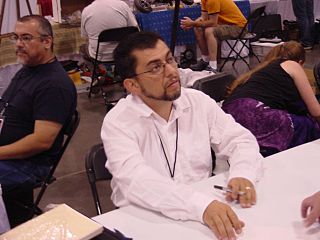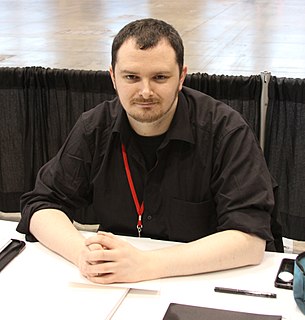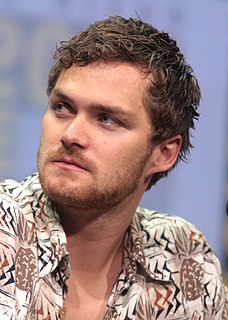A Quote by Jeph Loeb
Any platform that you use to tell stories helps you regardless of the medium regardless if they are bedtime stories that you tell your children or comics or film. Specifically what makes comics unique is that they are a storytelling device that forces you to think both visually and economically. Some might say you are limited by your imagination, but that is not true because someone has to draw it.
Related Quotes
I have been a comic book fan nearly all my life. My fascination began as a refuge after my father left because it was within the stories told in comics that I could find heroes who fought for justice and where outcasts or misfits could find purpose and commonality. But over time I have come to love comics as a medium for its ability to tell stories with tremendous depth and emotion that in some ways go beyond what is possible solely with the written word.
I loathe high/low art distinctions in any case, so the crossing and re-crossing of that line is an act to be savored and celebrated, regardless of how it turns out. I consider that transgressive aspect of the medium one of its great strengths. In the way comics is both words and pictures while being neither, comics is the Trickster's medium, and as such I would be happy if no one ever knew what to do with it.
What I think is great about Pippin, specifically, and I wouldn't make this generalization about all musicals, is that it is about how we tell stories and the way stories are very subjective. How we tell some things and leave other things out in the way The Princess Bride is or The Wizard of Oz is, which both have a framing device.
Storytelling, you know, has a real function. The process of the storytelling is itself a healing process, partly because you have someone there who is taking the time to tell you a story that has great meaning to them. They're taking the time to do this because your life could use some help, but they don't want to come over and just give advice. They want to give it to you in a form that becomes inseparable from your whole self. That's what stories do. Stories differ from advice in that, once you get them, they become a fabric of your whole soul. That is why they heal you.
The very act of story-telling, of arranging memory and invention according to the structure of the narrative, is by definition holy. We tell stories because we can't help it. We tell stories because we love to entertain and hope to edify. We tell stories because they fill the silence death imposes. We tell stories because they save us.
Humans are kind of story-propagating creatures. If you think of how we spend our days, think of all the time you spend on entertainment. How much of your entertainment centers around stories? Most pieces of music tell stories. Even hanging out with your friends, you talk, you tell stories to each other. They're all stories. We live in stories.
I think that comics and television, as mediums, go hand in hand. Both tell long-form, continuing stories that are parsed out into little chapters and, if are successful, continue for years and years. What that means to me, as a writer, is it tells stories of transformation and evolution as characters.
That's the type of thing you need to keep in mind when drawing comics. The storytelling. Consider the action and the space available to you, that's what will make it a great comics page. Once you've figured that out, you can always find/make the reference to support your storytelling decisions. So by all means, study film, but as with any reference, the results are better when they inform the craft and not dictate it.





































